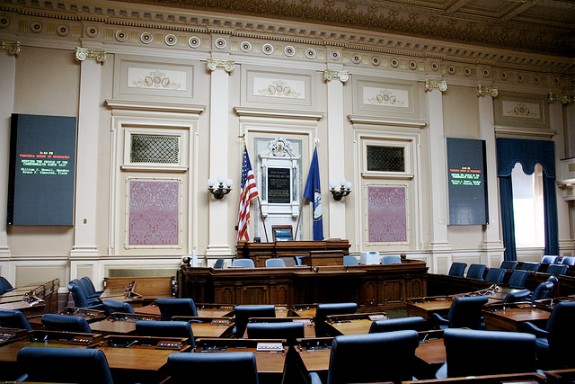The Virginia General Assembly that convenes in January 2012 will be much changed from the one that it replaces. Effective control of Virginia’s government—a Governor, House of Delegates and Senate— is now in the hands of legislators who have consistently sought to lead Virginia in the direction of states like Arizona and Alabama that boast of how inhospitable they are to undocumented immigrants. For example, one of the Governor’s first acts after his election in 2009 was to seek 287g authority for the State Police (a request that is still pending). And this fall’s legislative elections resulted in an increase in members of both the House and the Senate who ran on overtly anti-immigrant platforms. Delegate Jackson Miller (R-Manassas), one of the most anti-immigrant legislators, has just been elected as majority whip.
In past years, regardless of the party in the majority, the Senate has been a moderating force revising significantly or killing virulently anti-immigrant legislation passed by bi-partisan majorities in the House of Delegates. The overall shift in power to more conservative members—many with anti-immigrant campaign promises to keep—means, however, that anti-immigrant legislation previously stalled in the Virginia Senate could see new life in the 2012 Session.
Virginia currently has nearly 50 laws applicable to aliens and immigrants, including requirements for police to check the immigration status of those arrested and taken into custody (2008), presumptions against bail for persons in the country without authority (2008), and legal presence requirements for driver’s licenses (2004) and state funded social services (2005).
Virginia requires some employers to use E-Verify. In 2010, the legislature passed HB 737 requiring all state agencies to use E-Verify for new employees as of December 1, 2012, however, the Governor moved the effective date to July 1, 2011 by Executive Order. In 2011, the legislature required all companies with 50 or more employees seeking state contracts of $50,000 or more to use E-Verify (HB 1859). Another bill (HB 1727) would have required all employers with more than 15 employees and all holders of professional or business licenses to use E-Verify by December 1st of this year. It passed the House 76-23 but died in the Senate.
The issue of when a police officer can check someone’s immigration status has been a hot topic in Virginia for years. In 2006, a Prince William County ordinance originally required that, like Alabama, police check the immigration status of any person lawfully stopped if they reasonably suspected the person was in the country without authority. State law in effect since 2008, requires that every person arrested and taken into custody have his or her status checked at the time they are booked. And last year, a bill (HB 2332) that would have required every law enforcement officer to inquire into the immigration status of every person summonsed or arrested passed the House of Delegates by a bi-partisan vote of 68-31, before dying in the Senate.
This coming session, the legislature is likely to consider again a number of bills killed in prior sessions, including some constitutionally suspect proposals now being tested in federal courts:
- School enrollment status check requirements
- Banning admission to public colleges/universities for undocumented students even at out of state rates
- Mandating police to check the status of anyone they “reasonably suspect” to be undocumented
- Criminalizing the “harboring or transporting” of unlawful immigrants
- Mandating e-Verify for all businesses
- Banning business and professional licenses for undocumented immigrants
- Further restricting state or local benefits for undocumented immigrants
- Allowing employers to fire workers for speaking a foreign language in the workplace.
- Allowing employers to be sued by people with U.S. citizen or legal immigration status when they are fired or not hired by an employer that they allege continues to employ undocumented workers.
Even though many of these and other provisions of anti-immigration laws (like Alabama’s HB 56) have been enjoined by the courts, additional constitutionally questionable proposals may come up in Virginia for the first time in 2012. For example, Virginia may see proposals banning contracts between an undocumented immigrant and another person or declaring them unenforceable in state court, or proposals making it a felony for undocumented immigrants to enter into a “business transaction” with the Commonwealth. The Virginia legislature could try to make it a crime to fail to complete or carry an alien registration card (a law that in Alabama recently resulted in the arrest of a German Mercedes Benz executive), or prohibit employers from taking state tax deductions for wages paid to undocumented workers.
The defeat of Arizona anti-immigrant mastermind Russell Pearce may be a sign that the electorate is fed up with expensive immigration control bills that hurt the economy and do nothing to solve the problem. Let’s hope Virginia legislators get the message that extreme anti-immigrant legislation is not in anyone’s interest.
FILED UNDER: anti-immigration, E-Verify, jackson miller immigration, Restrictionists, undocumented immigration, virginia



